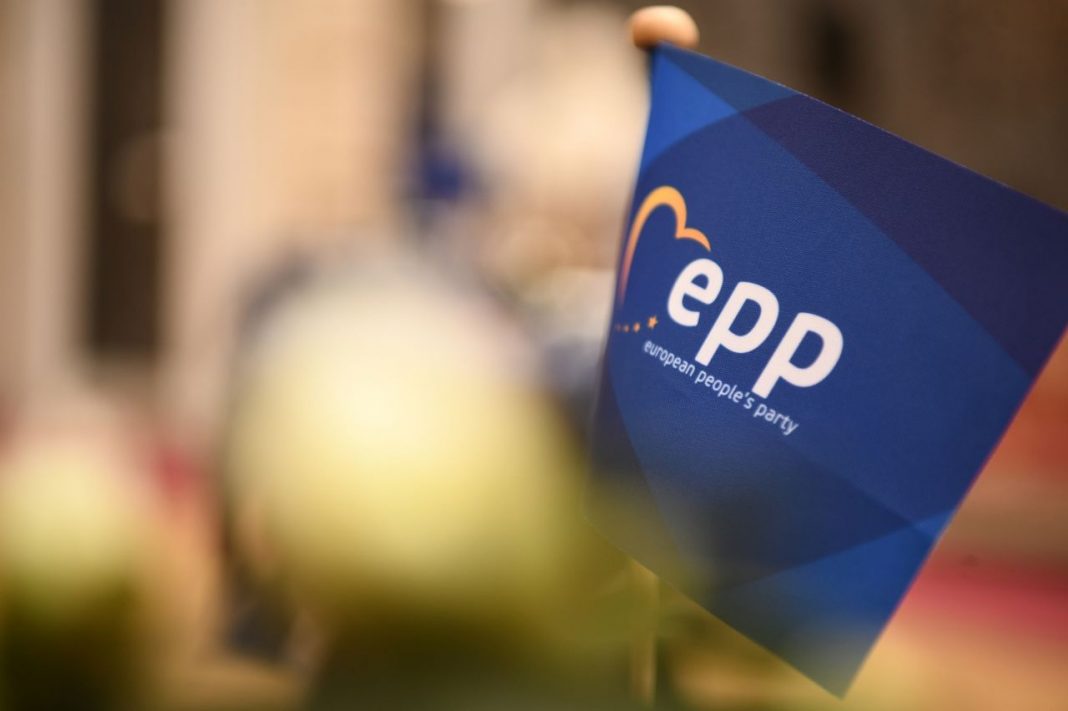According to the results of the upcoming elections to the European Parliament on June 6-9, the center-right “European People’s Party” (EPP) with a probability of 99.9% will remain as the largest political group in the EP. “Pessimistic” forecast Politico gives EPP 170 seats in the new composition of the European Parliament, but Euractiv is more optimistic – 180 parliamentary mandates. At the same time, it is worth recalling that as of today, the political group of the “European People’s Party” has 176 members out of 26 national parties of the center-right. At the last European elections in 2019, the party, despite its leadership, was short of 42 mandates and together with its traditional partners “Progressive Alliance of Socialists and Democrats” said goodbye to coalition dualism, as a consequence of which it was forced to agree to a coalition with the Macron-controlled “Renew”.
With this article Ascolta finishes the series of analytical materials about the European Parliament groups in the run-up to the next elections, which will start on June 6 and will become a determining factor for European politics for the next five years. Already now it can be noted that the European People’s Party has all chances to maintain its influence, but new challenges and threats clearly put the party leadership before the need for deep reforms.
This Content Is Only For Subscribers

It is obvious that increasing representation for any group of the European Parliament is not an end, but an opportunity to convert quantity into quality in the form of various powers. The EU does not have a government in the usual sense of the word, so there is no “governing coalition” in the European Parliament, i.e. a group of parties that would form the current composition of the European Commission. Nevertheless, fairly stable coalitions do form, for example, when voting on certain groups of issues: migration, economy, EU enlargement.
The European People’s Party (EPP) is likely to retain the “grand coalition of the center” together with the Progressive Alliance of Socialists and Democrats (S&D) and the liberals from Renewing Europe (RE). This is the same coalition that secured von der Leyen’s election as head of the European Commission last time around. In the current convocation, these factions control 420 seats, i.e. 60% of the entire European Parliament. In the new convocation, the centrist factions are also likely to retain a majority, although their share will drop to about 56%. Maintaining the coalition in such a composition, even despite the growing contradictions between the parties, as well as the risks of voting for von der Leyen’s candidacy, would still be the most preferable for them.
First of all, because it will allow the centrists to retain power in the European Parliament committees dealing with the legislative process. Now three centrist parties control 16 out of 20 committees and 4 out of 4 subcommittees. In addition, the centrists are massively against the strengthening of the right, and the formation of such a coalition will make it clear that the “right turn” has not happened, or at least is postponed, and pro-European forces remain in power. Nevertheless, conflicts between the current coalition partners have become increasingly frequent, going beyond the legislature.
In March, such a conflict broke out between S&D and EPP. After the Qatargate scandal, when it became known that some MEPs were lobbying for Qatar and other countries, it was decided to establish an independent ethics body to investigate individual cases of corruption. S&D supported the idea, while EPP opposed it. It felt that such a body would violate the rule of law by placing lawmakers under external control. However, on April 22, the Social Democrats, supported by the Liberals, Greens and Leftists, still prevailed on this issue. Other topics that are splitting the EPP and S&D are, above all, migration and the green agenda. Therefore, for the coalition to be sustainable, the partners will have to “step on their own toes” and sacrifice the divisive topics or look for new allies.
Recently, however, observers have increasingly started talking about an “unconventional” coalition configuration, which could include the ERR, the RE and one of the far-right factions, the European Conservatives and Reformists (ECR). Actually, there is nothing fantastic in such an alliance. In the Netherlands, for example, the “People’s Party for Freedom and Democracy” of the current Prime Minister Mark Rutte (VVD), which is part of the RE group, has already entered into a government coalition with the far-right Freedom Party of Geert Wilders. As well as the European People’s Party, which has government coalition agreements with far-right parties in Italy, Finland, Croatia, and at the local level in Austria – in Salzburg and Lower Austria.
According to the current forecast, such a coalition would have slightly less than half of the seats in the European Parliament (350). However, the party of Hungarian Prime Minister Viktor Orbán’s FIDES may join the ECR. According to the latest estimates, FIDES could win 10 or 11 seats, which would give the center-right coalition either exactly half of the MEP seats (360) or the minimum possible majority (361 out of 720 seats). That is why a fierce struggle for MEP seats in Hungary is underway right now between forces close to Orbán and the new opposition leader Péter Magyar and his TISZA party.
If a center-right coalition is formed in the European Parliament with FIDES, the strategy of the largest faction, EPP, will be to bring the ECR group closer and less radical. This plan would build on the already established good relations between ECR head Giorgia Meloni and key figures in the European Commission, including von der Leyen. At the same time, it will imply that some of the positions in the European Parliament committees will go to the far-right of the ECR and to Giorgi Meloni herself, which will make their voice more visible at the level of the whole Europe. However, the center-right coalition will simultaneously help the mainstream and pro-European forces from EPP to alienate the ECR faction from the other, more radical far-right faction ID, marginalizing it. At the same time, on some bills, part of the “ID” will organically continue to vote after this coalition – there will be no alternative more suitable for them.
However, von der Leyen’s “infatuation” with Italian Prime Minister Meloni and the prospect of working with the “ECR” may badly affect her chances of re-election as head of the European Commission. Especially increasing pressure on von der Leyen “left flank” – the Social Democrats, “Greens” and left-radicals, who held a real “parade” of ultimatums, saying that if the deal von der Leyen with the extreme right, they will not support her nomination for a second term. As many observers have noted, the left-wing parties are implementing a “clever strategy” to “cool” von der Leyen’s ardor against the far right. However, she cannot afford to lose the ECR either, as left-wing groups are not the most disciplined in keeping their promises, even if she makes concessions to them.
We’re losing her…
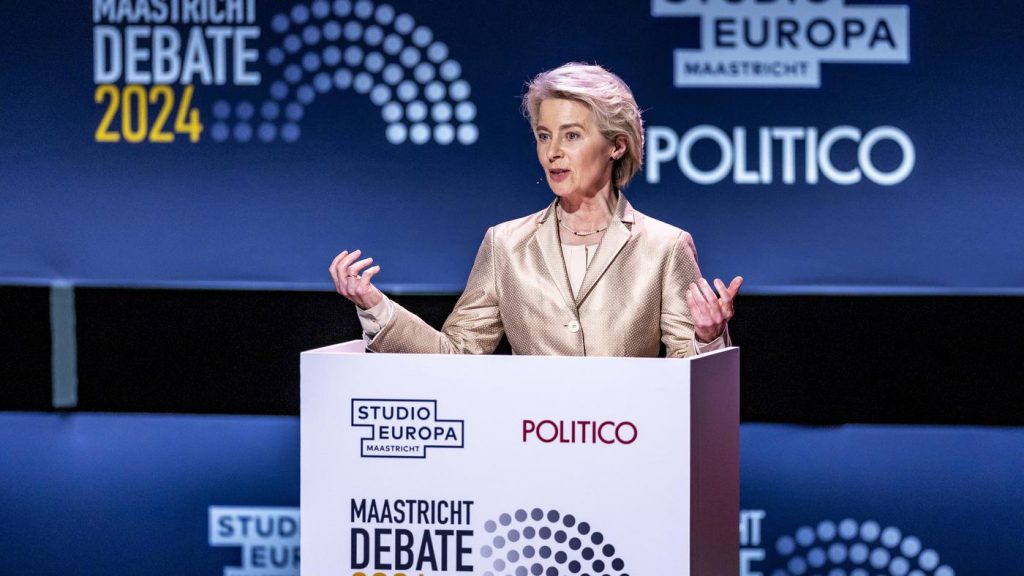
One of the main objectives of the European People’s Party, in addition to gaining electoral “points” in the elections to the European Parliament, is to retain Ursula von der Leyen as head of the European Commission. However, as noted above, recent political trends suggest that the EPP may lose her, which would be a tangible blow to the party’s credibility. In the five years since the last European elections, the position of the head of the European Commission has gained in political “weight”, and her election, as Euronews notes, “…from a behind-the-scenes procedure has now finally turned into an open battle – with candidates and debates watched by millions of Europeans who are concerned about instability in the world, wars and high inflation”.
According to the 2007 Lisbon Treaty, the President of the EC is nominated by a majority vote of the European Council, the highest political body of the Union, based on the results of the previous European Parliament elections. The latter must confirm the appointment by voting in favor of it by an absolute majority (50% plus one vote of the list of members, i.e. a minimum of 361 MEPs must vote for the candidate proposed by the European Council in the EP, based on its size). The full composition of the new European Commission must then approve already by simple majority (50% plus one vote of the number of MEPs present at the meeting).
According to the results of the European elections of 2019, Ursula von der Leyen became the head of the European Commission. However, initially the European People’s Party had another candidate for the post of the head of the European Commission – Manfred Weber – the head of the EPP political group in the European Parliament. It was an unsuccessful bet of the “people’s party”, because in the conditions of political fragmentation in the EU, his candidacy could not gather the double majority required for the appointment – both in the European Council and in the EP. His main opponent was French President Emmanuel Macron, whose party formed an alliance with the Liberals in the EP. However, characteristically, the liberals, united with the supporters of the French president, did not rally around their own alternative candidate for the post of the head of the European Commission, which could be Margrethe Vestager.
In these conditions, the chances of the Socialist Dutchman Frans Timmermans to become the head of the European Commission have appeared. His candidacy was strongly promoted by the duo of Emmanuel Macron and Spanish Prime Minister Pedro Sanchez. However, other heads of government from EU countries, where center-right parties performed more successfully, did not want to put up with it. Characteristically, Weber’s failure did not discourage Angela Merkel, who showed willingness to compromise. As a result, consensus prevailed in the ranks of the European Council. German Defense Minister Ursula von der Leyen (“ERR”), Angela Merkel’s closest political ally, was nominated to head the European Commission on the basis of Macron’s compromise proposal, although the latter formally abstained from supporting her for this post for domestic political reasons.
It would seem that after five years in charge of the European Commission, Ursula von der Leyen has managed to build up such authority that she can decide for herself with whom to “be friends” and with whom not, which coalition to choose and whom to exclude from her closest circle of contacts. However, a politician should always take into account the conditions of “realpolitic”, which have literally permeated the entire European political establishment and have a huge impact on European political realities. And today they are such that even the support of the largest European People’s Party, which at its party congress in March nominated Ursula von der Leyen as the leading candidate for the elections to the European Parliament from the EPP, does not automatically guarantee her victory in the elections for the head of the European Commission.
However, not everyone agreed with von der Leyen’s candidacy at the congress in Bucharest. Then, the French “Republicans” cast their vote “against”, accusing von der Leyen that her Commission has become too technocratic, overshadowing the ideology of the Christian Democrats. This allegedly allows the European majority to shift to the left. The French claimed that von der Leyen was actually an “agent” of President Emmanuel Macron. However, this argumentation can be disputed today, especially against the background of information circulating in the media that Emmanuel Macron is holding talks with EU leaders in the context of finding a replacement for Ursula von der Leyen as head of the European Commission.
In particular, as Bloomberg notes, Macron recently discussed with EU prime ministers, including Italian Prime Minister Giorgio Meloni, the possibility of electing former European Central Bank (ECB) President and former Italian Prime Minister Mario Draghi to a key EU post. Now von der Leyen, as Bloomberg notes, has faced discontent from some EU countries because of decisions she has made in recent years, particularly on trade, climate change and relations with the United States. Macron, as the agency writes, openly criticizes her activities. At the same time, Bloomberg interlocutors point out that they are not sure that Macron is looking for a replacement for von der Leyen. Perhaps the French president is putting pressure on her to make concessions in the future, the agency’s sources say.
At the same time, Macron’s visit to Berlin and meeting with Olaf Scholz, amid Social Democrats’ threats to “torpedo” von der Leyen’s second term if she continues to “flirt” with the far right, indicates the seriousness of the two leaders’ intentions to reshape Europe’s political landscape after the June 6-9 elections. Scholz made it clear: “When the next commission is formed, it should not be based on a majority that also needs the support of the extreme right.” He added that “the only way to create a Commission presidency is to build it on the basis of traditional parties.” In the social-democratic milieu, Draghi’s name is also increasingly being called for the role of head of the European Commission. Thus, Markus Tons, a German Social Democrat member of parliament, told POLITICO in Brussels, “Draghi has experience at the European level and knows the current problems. I would have no problem seeing him in that position – perhaps he is even better than Ursula von der Leyen.” And such an answer is very much to Paris’ liking. The question now is whether Scholz and his German Socialists will really give up a second term for their compatriot von der Leyen, and who they are willing to support to replace her.
Von der Leyen may get another blow from France – from Marine Le Pen, who approached Giorgi Meloni with a proposal to create a far-right supergroup in the EP from the “European Conservatives and Reformists” (“ECR”) and “Identity and Democracy” (“ID”). And that, according to current projections – 142 mandates, making the “supergroup” the third, or even second largest in the new European Parliament. As Politico notes, the realization of such a scenario will be a threat to the European People’s Party and Ursula von der Leyen, who has been “grooming” the Italian prime minister for several years, hoping to get support from the “ECR”.
According to Politico, the unity of the far right could provide the two groups with leverage on two major fronts. First, it could force a potential supergroup to block von der Leyen’s second mandate. Second, it could allow them to shift to the right the direction of EU policy on migration to climate. The move is now up to Meloni, who, however, is in no hurry to reveal her cards. One ECR insider told Politico, “It’s not easy for Meloni to team up with Le Pen and strip herself of power and influence.” Other experts believe that Le Pen’s statement should be seen with an eye on the 2027 presidential election, as she wants to shed her image as far-right and appear more conservative. Her criticism of the far-right Alternative for Germany (AdG) party, which was excluded from the ID group after a series of scandals, is from the same series. There is another opinion: Le Pen’s comment is nothing more than a “smokescreen” designed to hide the difficulties that the National Rally is having in securing its future in the European Parliament after breaking with the AdG.
So far, Ursula von der Leyen, as a disciplined candidate and leader of the party list, has shown very steady confidence during the debate of the candidates for the post of European Commission head, which took place on May 23. Among those invited to the debate were the candidates for head of the European Commission from S&D, RE, Greens/European Free Alliance and the Party of the European Left. These debates in the European Union have already been dubbed “Eurovision without viewers” because of their low television ratings. Representatives of far-right parties were not present at the debates, but they were invisibly present, moreover, they seized the agenda – it was the prospect of “normalization” of the far-right in European institutions that caused the most controversy among the leaders of the lists of European parties.
All participants in the debate criticized Ursula von der Leyen and her “European People’s Party” for their willingness to get closer to the “Brothers of Italy” and other partners of Giorgi Meloni in the “ECR” faction, including the Spanish nationalists “VOX”. In response, von der Leyen said that there are clear criteria that she and the head of the “European People’s Party” Manfred Weber have defined for future “ECR” allies – pro-Europeanism, rule of law and pro-Ukrainianism. And Meloni’s party, according to her, meets these criteria. She then dodged the question of whether she was concerned about Meloni’s LGBTIQ+ policy, as this option was not a red line for ERR in its quest to secure the EC leadership.
As Euractiv notes, civil rights may take a back seat in this scenario, as von der Leyen will need as many votes as she can get in what is likely to be a tough vote to take office in the European Parliament if EU leaders agree to nominate her for the post. In addition, the debaters discussed other topics: the fight against unemployment, migration agreements with third countries, regulation of artificial intelligence, and only briefly mentioned the wars unfolding in Ukraine and Gaza.
The debate temporarily interrupted the busy schedule of her campaign tour, during which she visited a number of countries in southern, northern and central Europe. During her campaign appearances, she tries to tailor her personal messages to each country she visits, drawing on key overarching policy themes that von der Leyen repeats with enviable consistency: the competitiveness and capital market alliance, investment in defense, accelerating the Green Deal policy, and combating foreign interference, which has become a hot topic in the wake of increasing cases of espionage and online disinformation into which individual European politicians have become embroiled.
European People’s Party – correction on the march
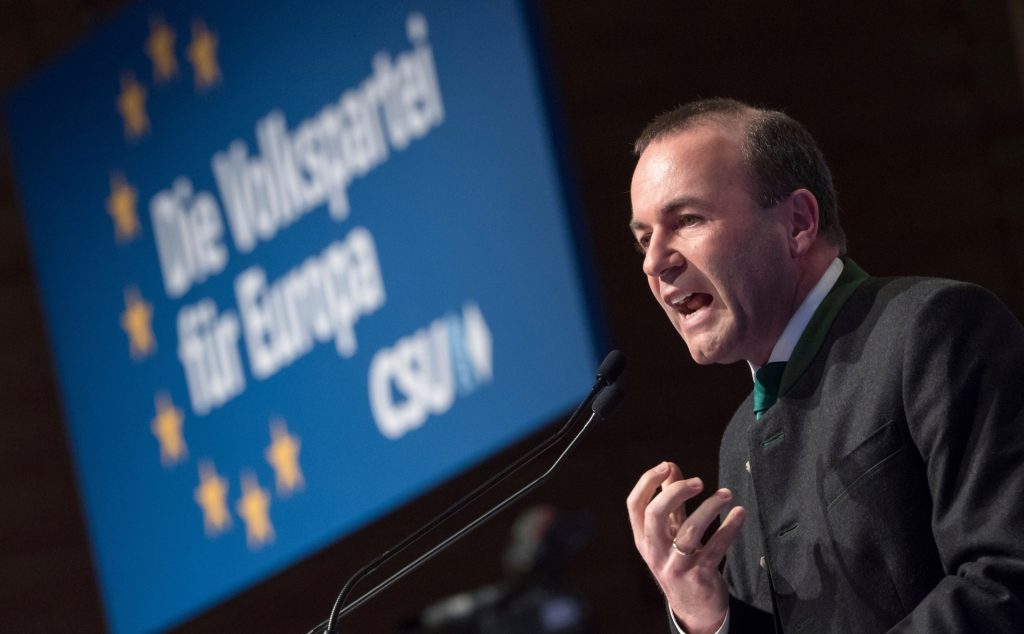
“My first message as president of the ERR is that the European People’s Party is back,” its new leader Manfred Weber said at the party congress in Bucharest, timed to coincide with the upcoming European Parliament elections, and emphasized: “Here in Bucharest you can see the engine of Europe,” he concluded. In addition to endorsing Ursula von der Leyen as the party’s leading candidate for the upcoming EP elections, the “European People’s Party” approved an election manifesto that addressed a number of proposed economic, social and institutional reforms and focused on three key topics on the agenda: migration, climate and defense.
The content of the manifesto showed that the European People’s Party has learned the right lessons in the five years since the disappointing, in many people’s opinion, 2019 elections. First of all, in overcoming its conservatism and responding more quickly to the needs of the electorate. As the right-wing turn that is gaining momentum in Europe is forcing the EPP to take a fresh look at some topics that are particularly sensitive to EU citizens.
These include, first of all, migration policy, which has become a “chip” for the ultra-right. Therefore, the European People’s Party was also forced to adjust its position in the direction of tougher measures to combat illegal migration. Firstly, this concerns strengthening the EU’s external borders and requires thorough checks on all people arriving in the EU illegally, as well as electronic monitoring at all entry points. If external borders prove insufficiently secure, the party does not rule out the introduction of controls at internal borders, which already exist in individual countries.
Secondly, the initiative to redirect asylum seekers to “safe” countries (outside the EU) where they would wait for their case to be resolved did not go unnoticed. This proposal has prompted comparisons with the British scheme. London intends to deport migrants who cross British territory illegally to Rwanda, where they will be able to make a claim for that very asylum. In her first debate, von der Leyen defended the multi-million dollar deals her European Commission has signed with Tunisia, Mauritania and Egypt to boost their national economies and reduce the number of illegal migrants heading to the EU. According to the European People’s Party, it is increased investment in Africa that will effectively address the root causes of migration.
The second topic that was subject to correction was the Green Deal. The European People’s Party was accused of opposing its implementation. In 2023, a group of ERR lawmakers came under fire for organizing a campaign to block the Nature Restoration Act, which aims to bring at least 20 percent of terrestrial and marine ecosystems back to their natural state by 2030. In response to critics, the ERR promised to open the next phase of the Green Transition and to prioritize European technology to increase competitiveness with producers from the U.S. and China, as well as provide farmers and fishermen with more financial assistance to adapt during the transition period.
A big controversy in the party was the issue of banning the sale of new cars with CO2 emissions in the EU from 2035. Initially, it was even planned to revise this norm in the party manifesto, but at the last minute this idea was dropped from the draft. The final text specifies that “engineers, not politicians, together with the market should decide on the best technology to achieve carbon neutrality”. It is worth noting that the position of the “European People’s Party” group on certain issues of the environmental agenda has already repeatedly led to friction with Ursula von der Leyen, who, incidentally, was one of the authors of the “Green Deal”, comparing it to “man’s flight to the moon”. That is why the election manifesto was aimed at finding a golden mean, promising to fight climate change while ensuring economic security.
Nevertheless, von der Leyen is constantly criticized for succumbing to party pressure and abandoning the progressive version of the Green Deal, which she herself had previously insisted on. However, an election campaign to please the voter requires sacrifices and adjustments to plans. Thus, a wave of mass protests by farmers forced von der Leyen to hastily revise a law aimed at reducing the use of pesticides. She also introduced measures to protect food producers from cheap Ukrainian imports and allowed them to use land that previously should have been untouchable on environmental grounds.
As can be seen, the far-right discourses on migration and the green agenda are forcing conservative parties to become even more “right-wing” in order to comply with the new political trend and the mood of the electorate, which is increasingly leaning towards nationalism and populism. Therefore, the national parties that are part of the “ERR” have only to adjust the general line of the party to the peculiarities of the local political color.
National characteristics of European conservatives
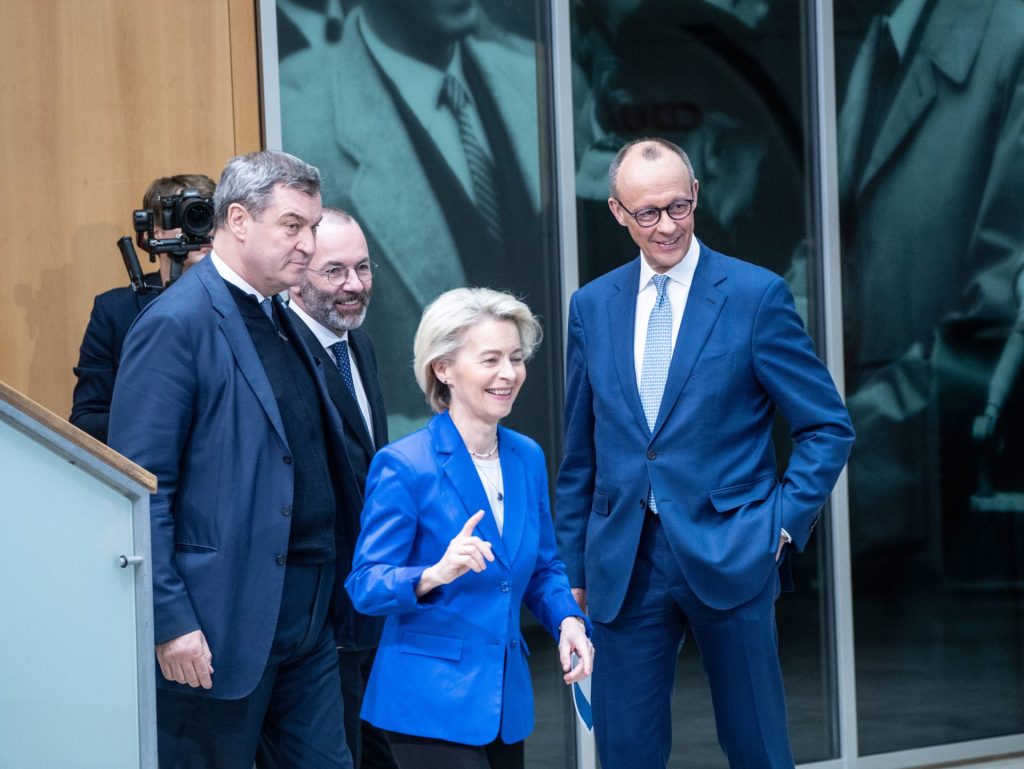
The largest representation in the EP political group “European People’s Party” belongs to Germany. The CDU/CSU party bloc has 29 parliamentary mandates from the 2019 elections. Today, the Christian Democrats (“CDU”), together with its sister party the Bavarian Christian Social Union (“CSU”), are in opposition in Germany itself. In the 2021 Bundestag elections, they lost to the German Social Democratic Party and, drawing a line under Angela Merkel’s rule, went into opposition, ceding the right to form a government coalition to the SPD, the Greens and the Free Democrats.
It is worth noting that the opposition adaptation for the CDU/CSU was quite successful. Against the backdrop of the declining ratings of the “traffic light coalition,” the Christian Democrats only gained ground by winning the land elections. In the 2023 elections to Berlin’s Land Parliament, after 22 years of Social Democratic rule, the CDU won with 28%, its best result since 1999. Olaf Scholz’s “humiliation” of the CDU/CSU bloc was next demonstrated in Bavaria and Hesse, where the same coalition governments remained in power. In the former, Markus Söder’s Christian Social Union (“CSU”) with the Free Voters, and in the latter, the Christian Democratic Union (“CDU”) with the Greens. In the Bavarian elections, the CSU won 37% and the SPD only 8.4%. The voters of Bavaria clearly demonstrated their attitude towards the government and the “traffic light” coalition. In Hesse, a federal state in which the Social Democrats held the prime minister’s seat for many years after the war and until the end of the last century, the CSU won the election convincingly with 34.6%. The Social Democrats received the worst result in history – 15.1%.
As can be seen, the results of the land elections in Germany show a stable trend – the growing popularity of the CDU/CSU and the declining rating of their opponents. Therefore, the result of a number of opinion polls showing their support at the level of 30% looks quite logical, and also ahead of their nearest pursuers from the SPD by 13 percentage points. As DW notes, the Union’s program is built on the principle of “yes, but”: climate protection – yes, but without coercion; market economy – yes, but with social security; European solidarity – yes, but with a firm fiscal policy.
However, this combination is not always achieved. The CDU favors delaying ecological transformation and opposes “ecodictatorship”. For example, one of the conditions of the Green Deal is to end the use of internal combustion engines from 2035, the CDU opposes this, believing that it would lead to the destruction of a key industry, the German car industry, which brings prosperity to Germany. After all, the German car industry is a world-class industry when it comes to combustion engines. Taking into account the “correction” of the electorate and following the “general line” of the European People’s Party both on the green agenda and on migration policy, the Christian Democrats are taking a much tougher stance than when they were in power until 2021.
On foreign policy issues, the CDU advocates strengthening EU security and defense amid Russian aggression against Ukraine. The Christian Democrats promised to provide Kiev with any assistance below Germany’s entry into the war. Party head Friedrich Merz confirmed that the CDU fully supports the need to transfer German Taurus missiles to Ukraine. The head of the CDU/CSU group in the European Parliament, Daniel Kaspari, accused German Chancellor Olaf Scholz of undermining confidence in Germany with his hesitation and delay in delivering aid to Ukraine. “We can understand if partners in Europe lose confidence in Germany. We Christian Democrats are hurt by this divided government. “The CDU is ready to take more responsibility in Germany and in Europe,” Kaspari pointed out. The CDU also advocates a “defensive alliance with a European defense commissioner and with a European missile shield.”
Most likely, according to the results of the European Parliament elections, the CDU/CSU bloc will retain its 30 seats in the “European People’s Party” group and will remain the leading faction within the “ERR”.
Spain is also starting to right itself
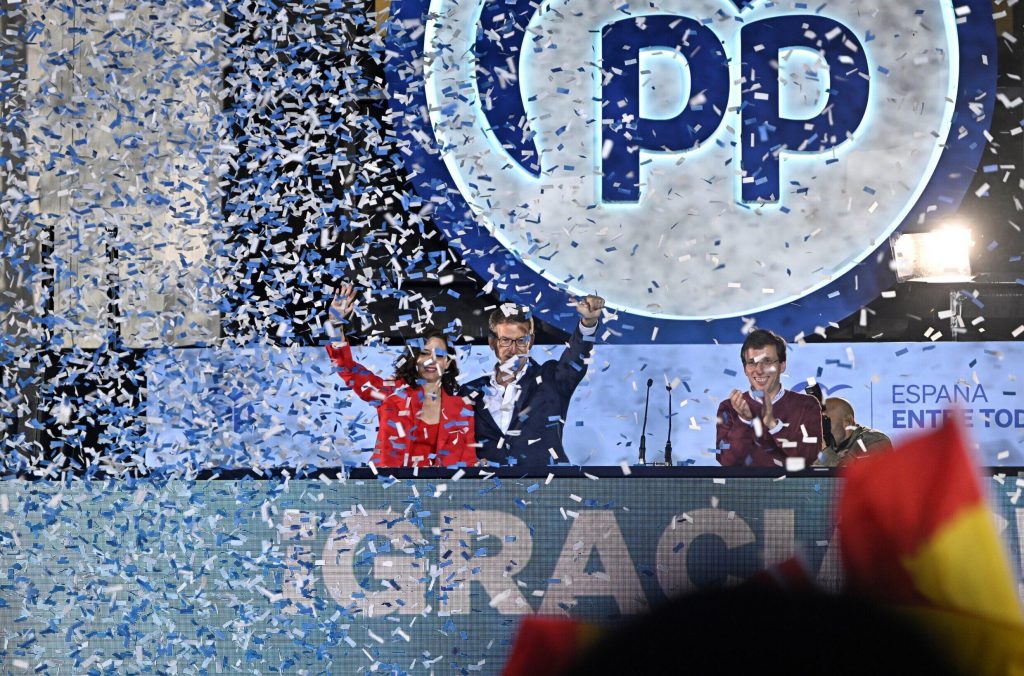
For polarized Spain, the struggle between left and right tendencies is the meaning and content of political life. After years of domination by Spanish socialists and left-radicals, it was the turn of the center-right from the “Popular Party” (PP) and the far-right from “Vox”. The shift to the right of Spain began after the parliamentary and regional elections of 2023, when the “People’s Party”, part of the “European People’s Party” group, won the parliamentary elections and won in most of the 12 autonomous communities. True, according to the results of the elections to the Congress of Deputies, despite his victory, “RR” Alberto Feijoo was unable to form a government and in the status of leader of the opposition traditionally leads an irreconcilable struggle with the “Spanish Socialist Workers’ Party” of the current Prime Minister Pedro Sanchez. However, in addition to the fight against Sanchez’s socialism, Alberto Feijoo has opened a new front – the fight against the far-right “Vox”.
Feijoo’s rhetoric toward Pedro Sánchez has never been more aggressive or categorical. At a recent People’s Party rally of thousands in Madrid, Feijoo demanded that Sánchez repeal the amnesty law for Catalan separatists, dissolve parliament and call new elections. The action itself was conceived as a kind of “thermometer” of citizens’ fatigue with “sanchism”, and the upcoming elections to the European Parliament as a referendum of no confidence in the socialist government of Pedro Sanchez.
It should be noted that not all supporters of the left approve of the amnesty law, thanks to which Sanchez won the support of the two Catalan separatist parties and formed a government. According to El Mundo, “such an offensive position allowed “RR” to “bite” from the Socialists up to 7% of their electorate. In addition, the “People’s Party” has essentially written a “political obituary” for the once popular party “Citizens”, snatching from it about 122 thousand voters”.
Following the “general line” of the European People’s Party “RR”, Alberto Feijoo is now also actively working on the far-right “Vox”, calling it an insurance of “Sanchism” because it promotes socialist mobilization with its radical rhetoric. According to the People’s Party, Vox is involved in political corruption as it collaborates with Pedro Sanchez to present itself as an alternative to Feijoo’s party and siphon votes from it. Nevertheless, the latest Sigma Dos poll for EL Mundo, predicts Alberto Feijoo’s “Popular Party” to win with 35% and 24-25 seats in the European Parliament, which would be 11-12 more seats than in the last election. Incidentally, Politico and Euractiv polls confirm the Spanish ratings, giving “RR” 35% and 36% respectively and an unquestionable second place in the “European People’s Party” political group.
“Go Italy!”: in the shadow of extreme right-wing partners
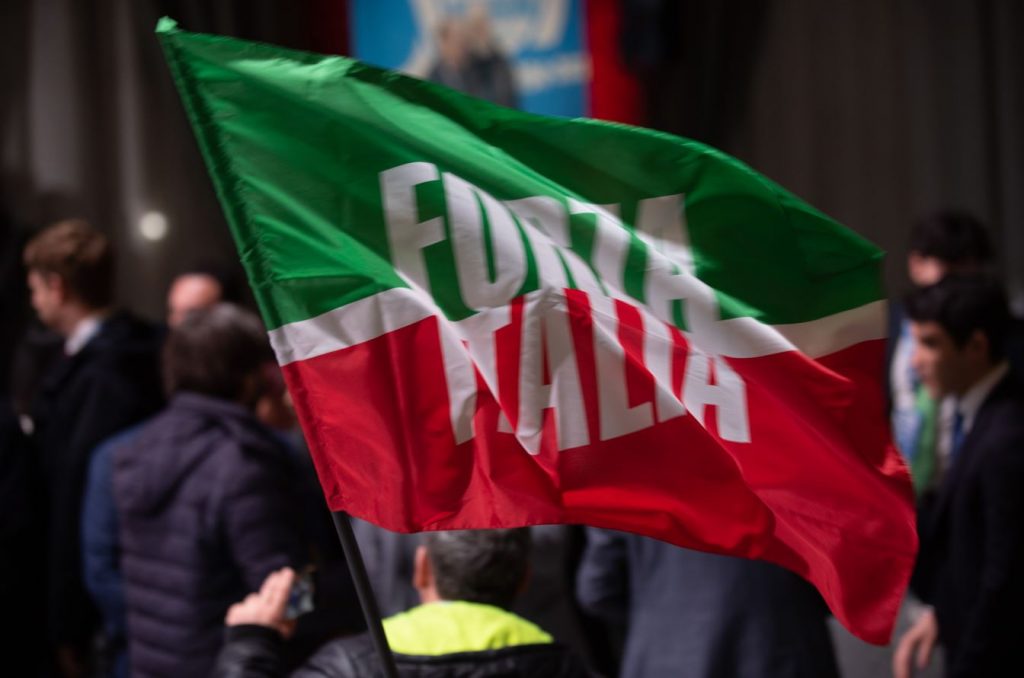
In another southern European country – Italy – the center-right is represented by the party “Go Italy!”. According to the results of the European elections of 2019, the party founded by Silvio Berlusconi scored 8.78% and won 7 parliamentary mandates, which after Brexit, increased to 10. Silvio himself, having been released early from the ban on holding elective office, became a MEP. The rather low result of Forza Italia! was explained by the fact that a significant part of their votes was “eaten up” by the then mainstream “Five Star Movement” in Italy. At the same time, the far-right Brothers of Italy party led by Giorgia Meloni, which built its campaign on a tougher migration policy, increased its influence. Two years later, Silvio Berlusconi and “Forza Italia!” went to early parliamentary elections. Berlusconi announced plans to run for the Senate to “make everyone happy.” According to the politician, many – including those outside his party – have pressured him to take part in the election. As part of the campaign, Berlusconi started a Tiktok, which became instantly popular, where, among other things, he told a self-ironic joke about himself, Putin, Biden and the Pope.
As a result of the elections, Silvio Berlusconi returned to the Senate, from which he was expelled in 2013 after his conviction. Negotiations began between the members of the winning right-wing coalition to form a government, which were not easy. In particular, Berlusconi was allegedly dissatisfied with the ministerial positions offered to representatives of his party. During the negotiations, Berlusconi was caught up in a high-profile scandal: the media reported, confirmed by an audio recording, that Silvio told his fellow party members that he had restored relations with his old friend Vladimir Putin, who had allegedly sent him 20 bottles of vodka for his birthday.
A day later, another recording of the same conversation was published – with disrespectful remarks about Ukrainian President Volodymyr Zelensky. In both fragments Berlusconi lamented that he could not openly express his point of view because it would provoke a scandal. The leak of Berlusconi’s statements again provoked talk that a new government might never emerge and that Berlusconi’s associate Antonio Tajani might lose his appointment as foreign minister; both fears were not realized. On October 20, 2022, Meloni issued a statement saying that Italy is “fully and with its head held high” a part of Europe and NATO, and dissenters will not enter her cabinet – even if no government is formed as a result. “Italy, with us at its head, will not become the weak link of the West, the untrustworthy nation that so many detractors find so endearing,” she said. Thus, “Go Italy!”, after winning several ministerial portfolios, became part of a right-wing coalition together with Matteo Salvini’s “Brothers of Italy” and “League”.
After the death of Silvio Berlusconi in June 2023, “Forza Italia!” was predicted by many to be politically dead, especially since Meloni and Berlusconi’s relationship was in constant tension. However, the party survived, it is led by Italian Foreign Minister Antonio Tajani and the upcoming European Parliament elections should be the first indicator of its popularity after the death of its charismatic leader. In memory of Silvio Berlusconi, his name has been included in the party’s statutes, and the “Go Italy!” logo for the 2024 European elections is adorned with the phrase: “Berlusconi President.” The example of the “Go Italy!” party, by the way, was followed by the “League” and the “Brothers of Italy”. Their logos bear the names of their leaders – Deputy Prime Minister Matteo Salvini and Prime Minister Giorgi Meloni.
It is worth noting at once that Antonio Tajani is far from Berlusconi, and “Go Italy!” is a party of the leader type. While Berlusconi himself set the tone of the campaign, Tajani is adjusting to the prevailing political trends. The main theme of his election campaign “Go Italy!” made the issues of economic development of Europe and strengthening of defense capabilities. Antonio Tajani believes that for “Forza Italia!” the first real reform is the one that provides for European defense. “If we want to be bearers of peace, we need a European army. And this is a fundamental prerequisite for an effective European foreign policy,” he believes.
He supports the proposal to establish a defense commissioner. Forza Italia!” sees another important reform as the optimization of the EU leadership. In particular, the party is convinced that the European Union should have a single presidency, rather than a president of the European Council and a president of the European Commission, as is currently the case. In “Forza Italia!” believe that the two-headed structure has outlived its age. Actually with such an asset of the party it is hard to count on a good result. Moreover, during the campaign, strange metamorphoses began to occur with Tajani.
Ursula von der Leyen’s passionate admirer – at the congress in Bucharest he swore to her in “eternal political love” suddenly cooled in “feelings” towards her. During the pre-election trip to Italy, von der Leyen’s “Forza Italia!” essentially self-involved in the organization of her visit, looking around to avoid damaging her image inside the country, and the party’s senator Liscia Ronzulli called her a “lame horse”. Thus, von der Leyen did not attend the “Forza Italia!” campaign rally, and at the last minute canceled a planned discussion with students at Luiss University because Tajani had scheduled a meeting to discuss EU agricultural policy. As a parting “gift” to his guest, Tajani criticized von der Leyen for her Green Deal policy at a meeting with the Forza Italia youth movement. The inconsistency and inarticulateness of today’s “Go Italy!” campaign is clearly affecting the electoral position of the party, which is in the shadow of its senior partner in the government coalition, the Brothers of Italy. Forecast figures place the party’s rating at 8-9%, which brings “Forza Italia!” and the “European People’s Party” group 7 parliamentary mandates, three less than in the last European elections.
Tusk is a force to be reckoned with
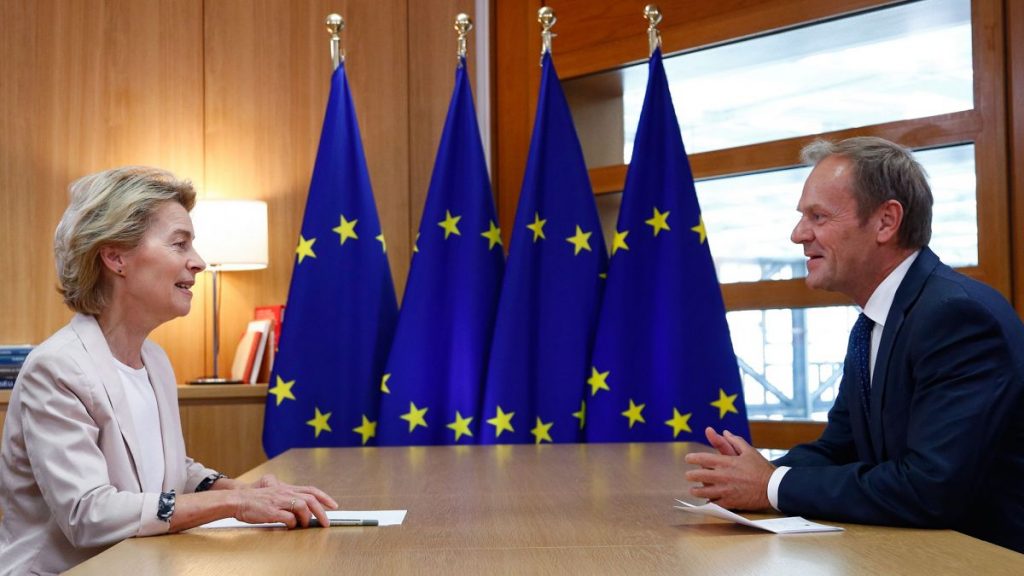
Among the countries that today can significantly increase the representation of the European People’s Party group in the European Parliament are Poland and Prime Minister Donald Tusk’s Civic Coalition party. The main intrigue of the current European elections, as well as of the two previous ones – parliamentary and local – is Tusk’s confrontation with the right-conservative party “Law and Justice” (PiS) of Jaroslaw Kaczynski. The weak link in Poland’s “European elections” has always been voter turnout. That is why Tusk’s rhetoric is mobilizing and replete with phrases about the radical impact of the European Parliament elections on Poles’ daily lives, especially in the face of threats from the East.
In order to keep his words in line, Tusk reshuffled the government, relieving four key ministers of their duties so that they could focus on participating in the election campaign for the European Parliament. According to experts, the running of high-ranking officials is a move to mobilize their electorate and prove the importance of the upcoming elections. The second motivational theme is the threat from the East, Putin’s and Lukashenko’s regimes. Therefore, one of the main “chips” of the “Citizens’ Coalition” in this election campaign is to strengthen Europe’s defense capabilities and form a large-scale anti-Russian front. In this context, Tusk and his party are fully in line with von der Leyen’s defense initiatives, supporting her aspiration to appoint an EU special commissioner for defense and increase EU defense spending to at least 100 billion euros.
Tusk is also calling on Europe and the U.S. to tighten sanctions against Putin’s regime and advocating that the West use all frozen Russian assets, not just the excess proceeds from them, to help Ukraine. During a visit to London by Polish Foreign Minister Radoslaw Sikorski, he told The Guardian that Poland supports Ukraine’s right to strike military targets inside Russia and signaled that higher stakes and increased escalation from Europe would force Putin to think more carefully about his intentions. Poland’s hawkish stance is working both domestically and in the EU as a whole. After all, against the background of the “decrepit” two “lame ducks” Macronet and Scholz, Tusk, with his tough and intransigent anti-Russian rhetoric, has become an inevitable force to be reckoned with by both Berlin and Paris.
Russia’s full-scale invasion has changed the political weight of Eastern European countries in general, and their voice is becoming more powerful every day. In the course of the election campaign, Tusk is tackling a number of other challenges. First, he wants the Civic Coalition to secure its position as the dominant political force after it failed to achieve a final victory over the former ruling party Law and Justice in the local elections. During the campaign, Tusk’s party positioned itself as the main fighter against PiS, transparently alluding to their “Kremlin ears”. This strategy allows them to “bite” a significant part of the electorate from their government coalition partners “Third Way” and “Levica”, whose ratings today are even lower than their results in the April local elections. This also fits into Tusk’s general concept of building up the “muscle” of his political power, because already today in the European elections, and then in the presidential elections in 2025, coalition partners will turn into opponents, not to mention PiS, which hopes that victory in the EU elections will lead them to the presidential summit in 2025.
Today, Tusk is fully in line with the policy of Ursula von der Leyen, whom he supports with all his might. However, this support can also be seen as a quid pro quo. It was at von der Leyen’s suggestion that Warsaw unblocked the payment of 137 billion euros from EU funds intended for Poland, which had been frozen due to problems with the rule of law in the country under the previous government. And more recently, the European Commission terminated the EU’s Article 7 sanctions procedure against Poland, which theoretically could have led to Warsaw being stripped of its voting rights in the EU. Therefore, having lent a shoulder at a difficult time for von der Leyen, Tusk may well count on her reciprocal “attention” in case of her election as head of the European Commission. Today, the Civic Coalition is one of the few center-right parties that will show a good increase in parliamentary mandates. At the national level, it is neck and neck with Jaroslaw Kaczynski’s Law and Justice party. According to current polls by Politico and Euractiv, both parties have 34% of electoral support so far. This result will allow the Civic Coalition to hold 17 MEPs in the European Parliament, which will be 6 more than in the 2019 European elections.
An alliance of “sworn” friends
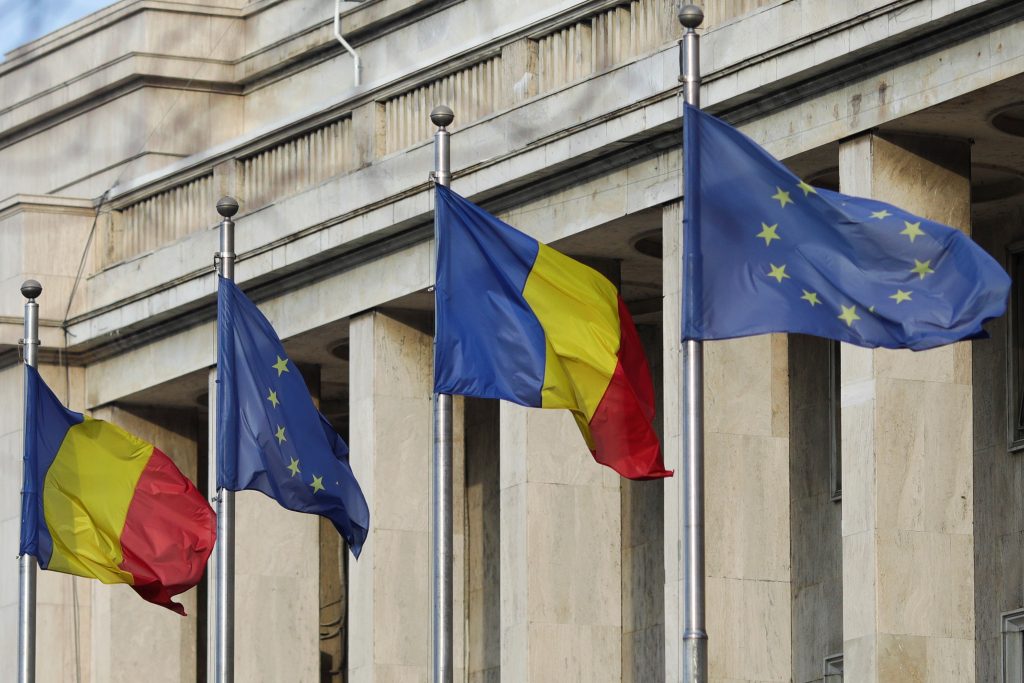
And in Romania, the National Liberal Party, a member of the European People’s Party group, is going to the 2024 European Parliament elections in an unnatural alliance with its sworn “friends” from the Social Democratic Party. It is worth noting that such an alliance was formed to break the political deadlock following the results of the 2020 parliamentary elections. Then the two largest parties in Romania simply shared power – the head of “PSD” Marcel Ciolacu headed the government, and the head of the “National Liberal Party” Nicolai Ciuche became speaker of parliament. This division of power is quite satisfactory for the two leaders, especially during the Romanian electoral marathon.
This year, the country will hold four election campaigns: local elections will be held together with the European ones, and in the fall, elections for the president and members of parliament will be held. And as the local press notes, Cholaku wants to remain at the helm of the executive branch, while Chuke is seeking the presidency. It is important to note that this alliance has very dubious prospects. And if at the central level everything is relatively smooth in the partners’ relations, at the local level many liberals openly express dissatisfaction with their “allies” and do not want to support SDP candidates in local elections. However, as is always done in such cases, the big bosses, having agreed among themselves, turn on the “carrot and stick” mode and subdue the protesters.
Regarding the upcoming European Parliament elections, the National Liberal Party from the alliance with the Social Democrats will probably win in Romania but will undoubtedly lose in Europe. Compared to the 2019 European Parliament elections, in which the NLP won 26.8% of the popular vote and 10 seats, despite the alliance’s overall high rating of 34%, the party is likely to lose 4 seats in the group. Two other parties from Romania in the “ERR” group – “Democratic Union of Hungarians of Romania” and “Alliance of Romanian Unity” are struggling to overcome the 5% barrier and at best will win one mandate each, which would also be the worst result compared to the last European elections.
With mixed success
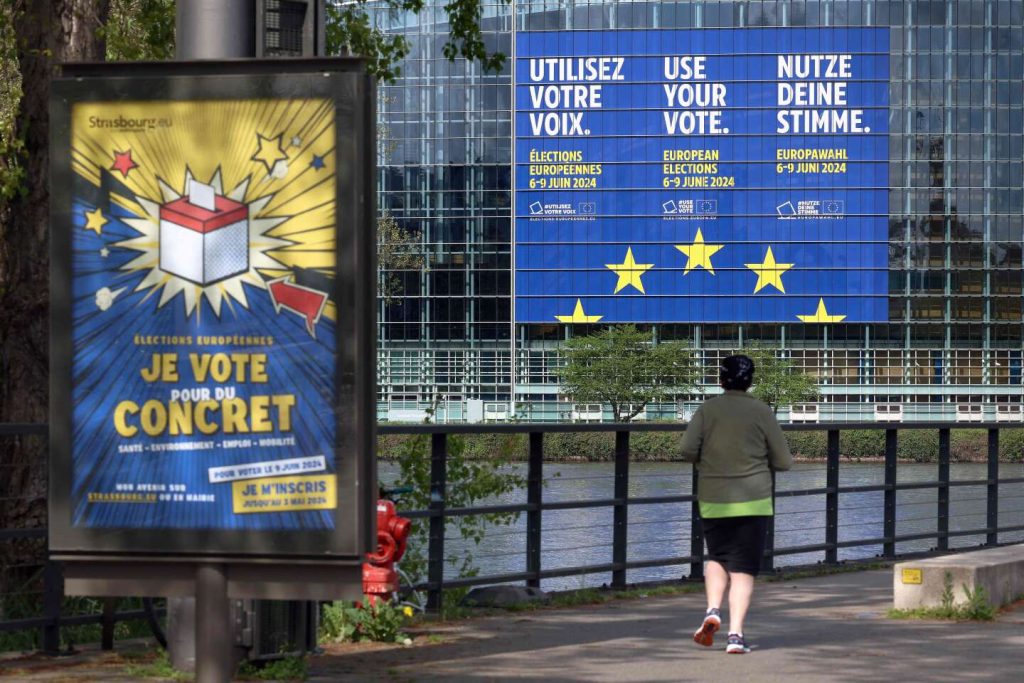
The French “Republicans” will also retain their representation in the ERR group. Traditionally, the Right has historically been less successful in European elections, they are now far from the 20% obtained in 2014, when they were the first opposition party. In the 2019 elections, they gained 8.5% and won 7 parliamentary seats. The “Republicans” running for the upcoming elections, under the leadership of “ERR” MEP and party leader Francois Xavier Bellamy, are likely to repeat the result of the past European elections.
You have to hand it to Bellamy, who is running a competent campaign. It includes many meetings with voters and unexpected event components. Thus Bellamy visited the Sciences Po Paris premises during a blockade of the university by pro-Palestinian students. “Political debate is free and open as long as it does not block or interfere with those who are working. I can no longer tolerate our universities being held hostage,” he said after an acrimonious conversation with MP Louis Boyard, who supports the blockade.
Repeatedly Bellamy visited centers for drug addicts, where he voiced the idea of creating a European anti-drug police. Bellamy is also in favor of a tougher policy on illegal migration, which puts him on a par with Le Pen’s “National Union” and Zemmour’s “Reconquista”. The vigorous campaigning is paying off. Starting from 6%, the “Republicans” demonstrate electoral dynamics, and today sociological polls fix their rating at 8%, and among 18-25 year olds Bellamy’s rating reaches 15%.
In all likelihood, the “European People’s Party” group will lose in the countries that have long been the bastion of the center-right – Austria and the Netherlands. Today’s polls suggest that the Austrian People’s Party will receive a resounding electoral “slap in the face” compared to past European elections. If in 2019 it scored 34.55% and won 7 seats in the European Parliament, today its rating is at 20%, which promises the Austrian “people’s party” only 4 European mandates.
To a large extent, the fall in the People’s Party’s rating is due to the “correction” of the Austrian electorate, as evidenced by the ratings of the far-right Austrian Freedom Party, which is now 9 percentage points ahead of the “People’s Party”. Another and more compelling reason is the electorate’s fatigue with the long tenure of the “NPA” at the helm of power. Today, the party’s agenda differs little from other center-right parties in Europe, and the lack of “zest” in the campaign does not naturally contribute to the growth of party ratings.
A similar situation is happening in the Netherlands, where two parties belonging to the group of the “European People’s Party” – “Christian Democratic Appeal” (CDA), which had 5 seats in the 2019 elections, and “Christian Union” – 1 seat – will suffer a crushing defeat in the European elections of 2024. In the Netherlands, there is no passing barrier in the European Parliament elections, which makes life easier for outsider parties and guarantees at least one seat in the EP. This applies to the “Christian Union”, which, even with 3%, will remain with one mandate. But the situation is somewhat different for another center-right party in the Netherlands, the Christian Democratic Appeal. On the eve of the 2023 parliamentary elections, a group broke away from CDA to form the New Social Contract (NSC) party. The brazen newcomers “overtook” the Christian Democratic Appeal (3.31%) with 12.88% in the parliamentary elections, and after long negotiations managed to become part of the government coalition, which will be headed by former intelligence officer Dick Schoof as prime minister. As of today, the Christian Democratic Appeal, with a rating of 5%, can only count on three parliamentary seats in the “European People’s Party” group.
In other EU countries, the European People’s Party will have neither resounding victories nor crushing defeats, and everything is going towards the fact that the EPP will retain the status of the leading group in the European Parliament, though with many reservations. It is not by chance that experts are already betting whether the number of deputies from extreme right-wing groups will exceed the number of the “European People’s Party” group. Therefore, it is too early to uncork the champagne for the “People’s Party”, because the main battles are still ahead, the formation of a “grand coalition” and the elections of the governing bodies of the European Union, and it is not certain that luck will always be on the side of the “European People’s Party”.

